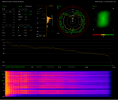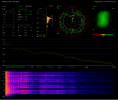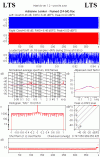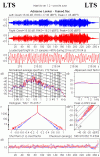JeremyFife
Major Contributor
Hi, I wonder if anyone here can offer some insight
I noticed that Bandcamp (music streaming, selling and download site with a good track record of paying artists a decent amount) was offering music by Adrienne Lenker in 'regular' 16/44.1 and also in a more expensive 24-bit format. I've no illusion that high-res should sound better in any way but I was intrigued.
I think Adrienne is fantastic anyway so I was happy to explore https://adriannelenker.bandcamp.com/music and I bought a song in each of the two versions. I'm pretty sure they are identical. I can't share the actual music, obviously for copyright reasons, but I did run them through MusicScope and MasVis (reports attached)
I also opened them in Audacity, inverted one and mixed them together ... resulting in a flat line (not surprised).
They sound the same to me ... brilliant, but the same.
The reports say different things, and I'm aware that I don't really understand what they are saying.
Can anyone confirm that these are basically identical, or am I missing anything? Does the 24-bit version contain any extra information? What would be the point of putting both of these versions out, apart from wanting to part the gullible from their money?
I noticed that Bandcamp (music streaming, selling and download site with a good track record of paying artists a decent amount) was offering music by Adrienne Lenker in 'regular' 16/44.1 and also in a more expensive 24-bit format. I've no illusion that high-res should sound better in any way but I was intrigued.
I think Adrienne is fantastic anyway so I was happy to explore https://adriannelenker.bandcamp.com/music and I bought a song in each of the two versions. I'm pretty sure they are identical. I can't share the actual music, obviously for copyright reasons, but I did run them through MusicScope and MasVis (reports attached)
I also opened them in Audacity, inverted one and mixed them together ... resulting in a flat line (not surprised).
They sound the same to me ... brilliant, but the same.
The reports say different things, and I'm aware that I don't really understand what they are saying.
Can anyone confirm that these are basically identical, or am I missing anything? Does the 24-bit version contain any extra information? What would be the point of putting both of these versions out, apart from wanting to part the gullible from their money?



